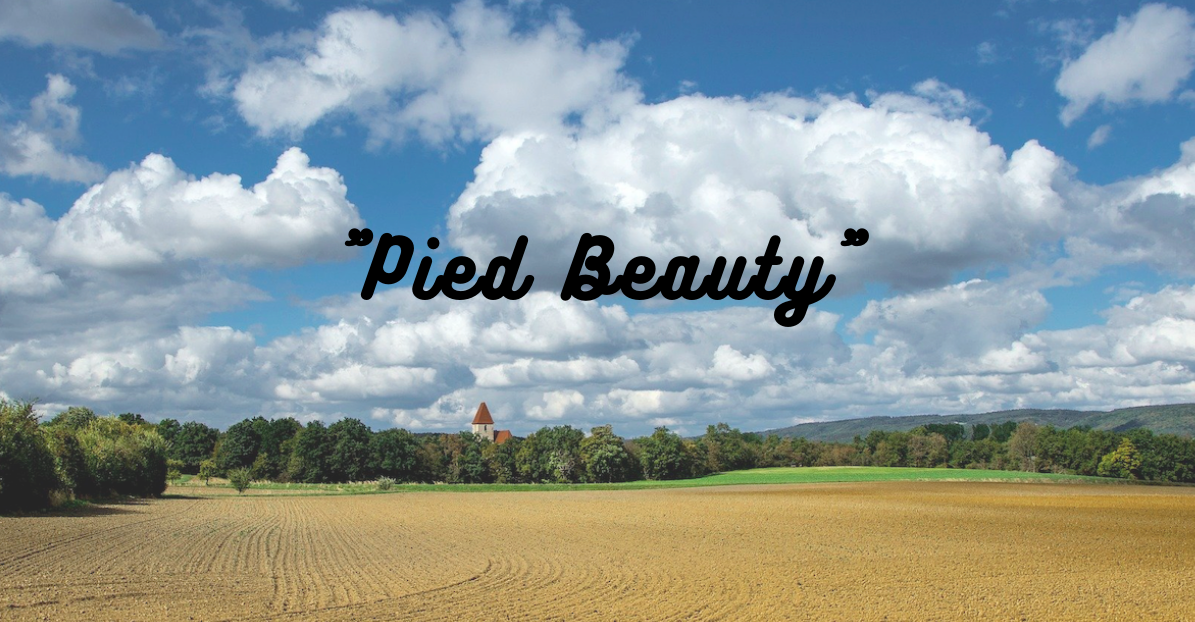Because everyone loves a good story
Masterful Poems: “Pied Beauty”

“Glory be to God for dappled things.”
So begins a poem of praise by my favorite poet, Gerard Manley Hopkins. This little two-stanza gem packs plenty of power in fewer than a dozen lines. Hopkins uses rich descriptions in such a short space that reading it takes a moment but savoring it takes much longer. Won’t you savor it with me?
A Brief Bit of Backstory
In Victorian England, the young Hopkins vowed to become a Jesuit priest. This was a very strict sect of the priesthood, and Hopkins devoted himself to it completely. While his duties included quite a bit of academics (he took and taught many classes throughout his short life), he also had time to take in the beauty of the Irish countryside around him. For this artist, reflection led to verse. His poems are replete with snapshots of God’s creation, from birds and sunsets to a celebration of God’s creativity in general. That’s what this poem is about.
“Pied Beauty”
Glory be to God for dappled things –
For skies of couple-colour as a brinded cow;
For rose-moles all in stipple upon trout that swim;
Fresh-firecoal chestnut-falls; finches’ wings;
Landscape plotted and pieced – fold, fallow, and plough;
And áll trádes, their gear and tackle and trim.
All things counter, original, spare, strange;
Whatever is fickle, freckled (who knows how?)
With swift, slow; sweet, sour; adazzle, dim;
He fathers-forth whose beauty is past change:
Praise him.
Beauty in Variety

Oh, friends. These descriptions melt my heart. First of all, savor the images of beauty. Hopkins celebrates the uniqueness of pink freckles on a fish and a sky streaked with fine wisps of cloud. (In fact, look up images for “brinded,” won’t you? You’ll know just the kind of clouds he has in mind.)
As he looks around him, the blaze of auburn from a fallen chestnut, the flash of vibrant yellow from a finch’s wing, and the rolling patchwork quilt of farmland draw his eye. Not unlike Walt Whitman, Hopkins finds fodder for interest even in the “gear, tackle, and trim” of everyday laborers. The uniqueness of each calling and duty impresses him with the creativity of the One who made such a world.
Everyday Wonderful
But Hopkins isn’t just luckier than thou; we’re all surrounded by everyday beauty. We may not get to roam in a rural Irish landscape, but I truly believe that beauty is everywhere for those who seek it. Even the beauty that Hopkins celebrates is fairly prosaic, really: sky, fish, nuts, birds, land, tools. But he follows the beauty up to its Source and is duly amazed that all this variety comes from one Maker. His observations lead to praise.

When I moved from Michigan to deep south Texas for a while, the landscape was completely different. Many people have a hard time finding beauty in the flat, dusty, parched terrain. But I was ready to love it, so God showed me plenty to love: cactus in bloom; spindly, swaying palms; blazing sunsets; tiny lizards (even if they were in the bathtub); crashing ocean waves; verdant fields of sugar cane; flocks of parrots overhead; and sizzling, savory tacos. Oh, praise God for those tacos. Amen and amen.
Beauty is there for those who have their eyes (and mouths) open.
Beauty Past Change
We see that nature’s scope and variety spring forth from a God whose beauty encompasses all we see and more. For this he is worthy of praise! But that’s not the only application Hopkins draws here. He also directs our attention to the truth that God’s beauty is “past change.” Let me confess that until I started writing this, I wasn’t sure why Hopkins chose to describe God’s beauty this way. Usually we think of beauty as past description or comparison, but not past change.
Then I realized he was pointing us to James 1:17.
“Every good gift and every perfect gift is from above, coming down from the Father of lights, with whom there is no variation or shadow due to change.”

God’s infinite fecundity fathers forth every good and perfect gift—the unimaginable variety of life—and yet he is beyond variation. He makes all things “swift, slow; sweet, sour; adazzle, dim,” and yet he will never have a momentary flicker of shadow due to change. The God who made the surprising contradictions of nature will never surprise us by contradicting his own character. The Father of lights can have no shadow. This is great news indeed! Praise him!
Take a Hike
I had hoped to wax eloquent upon the poem’s masterful composition, but I’m afraid it would take too long. I’d like to dwell on the vocabulary, rhyme scheme, imagery, and all his lovely consonance, assonance, and alliteration, but I don’t want to trespass on your time. Suffice it to say that his craftsmanship impresses me as much as his content.
But instead of sitting here reading about things I find beautiful, may I humbly suggest that you take a hike? It’s spring, and I can’t get enough of the outdoors. Even as I write this I’m surrounded by grass, trees, and flowers (and also pollen) on my back patio. So go ahead—take a hike and praise the One who fathers forth all that variety.
Source:
https://www.poetryfoundation.org/poems/44399/pied-beauty

Thank you Emily! A great reminder that we are surrounded by the beautiful creation of God. Awesome poem! Makes me want to look at God’s handiwork with greater appreciation.